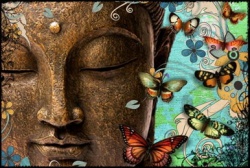Difference between revisions of "Gunamati"
Jump to navigation
Jump to search
m (Text replacement - "Central Asia" to "{{Wiki|Central Asia}}") |
|||
| Line 4: | Line 4: | ||
[徳慧] (n.d.) (Skt; Jpn Tokue) | [徳慧] (n.d.) (Skt; Jpn Tokue) | ||
| − | A [[monk]] of the [[Consciousness-Only school]] who lived in southern {{Wiki|India}} around the sixth century, revered as one of the ten great {{Wiki|scholars}} of the school. According to The Record of the Western Regions, [[Hsüan-tsang]]'s account of his travels in {{Wiki|Central Asia}} and {{Wiki|India}} in the seventh century, [[Gunamati]] refuted the [[non]]-[[Buddhist]] {{Wiki|scholar}} [[Madhava]] who enjoyed the [[respect]] and {{Wiki|patronage}} of the {{Wiki|king}} of {{Wiki|Magadha}}, and converted the {{Wiki|king}} to [[Buddhism]]. Later he lived at [[Nalanda]] [[Monastery]]. He is the author of The Commentary on "The Thirty-Stanza Treatise on the [[Consciousness-Only]] [[Doctrine]]." | + | A [[monk]] of the [[Consciousness-Only school]] who lived in southern {{Wiki|India}} around the sixth century, revered as one of the ten great {{Wiki|scholars}} of the school. According to The Record of the Western Regions, [[Hsüan-tsang]]'s account of his travels in {{Wiki|{{Wiki|Central Asia}}}} and {{Wiki|India}} in the seventh century, [[Gunamati]] refuted the [[non]]-[[Buddhist]] {{Wiki|scholar}} [[Madhava]] who enjoyed the [[respect]] and {{Wiki|patronage}} of the {{Wiki|king}} of {{Wiki|Magadha}}, and converted the {{Wiki|king}} to [[Buddhism]]. Later he lived at [[Nalanda]] [[Monastery]]. He is the author of The Commentary on "The Thirty-Stanza Treatise on the [[Consciousness-Only]] [[Doctrine]]." |
</poem> | </poem> | ||
{{R}} | {{R}} | ||
Revision as of 17:37, 12 September 2013
Gunamati
[徳慧] (n.d.) (Skt; Jpn Tokue)
A monk of the Consciousness-Only school who lived in southern India around the sixth century, revered as one of the ten great scholars of the school. According to The Record of the Western Regions, Hsüan-tsang's account of his travels in [[Wikipedia:Central Asia|Central Asia]] and India in the seventh century, Gunamati refuted the non-Buddhist scholar Madhava who enjoyed the respect and patronage of the king of Magadha, and converted the king to Buddhism. Later he lived at Nalanda Monastery. He is the author of The Commentary on "The Thirty-Stanza Treatise on the Consciousness-Only Doctrine."
